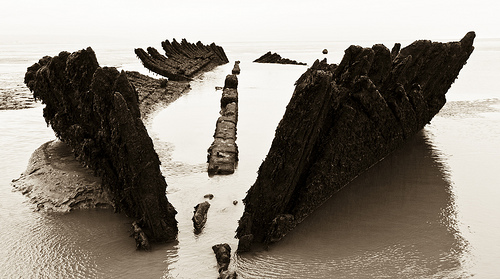(and this is a common failing of mankind, never to anticipate a storm when the sea is calm) – Niccolò Machiavelli

A savage storm in the spring of 1897 left this ship wrecked in the mud flats. If they could have anticipated the storm, they could have been someplace else.
What does that mean?
This is a neat quote, as it is literally a parenthetical note at the end of a discussion of two Princes who lost their cities due to complacency (thus the lack of traditional punctuation). By not anticipating that things, once they had become calm, could ever stir back up, they were caught unprepared when trouble arose. This lack of preparation, in turn, cost them their cities.
This holds true today. How many of the leaders of Arab Spring countries were prepared for the storm? There are a few countries that were able to quash the uprisings, or are still working on it, but most were not prepared, and have been swept aside.
I would caution that this quote is not just for princes and dictators, but for all of us. Life can throw a storm at you at any moment. Being prepared for the storm is important. Anticipation of the storm is important. Anticipation of the events leading to the storm is even more important.
Why is anticipation important?
In the modern world, ships use weather maps to anticipate storms and avoid them. To me, this is a better course of action than simply being prepared for a storm. The first is proactive, looking for and anticipating a difficulty before it becomes a ‘storm,’ and avoiding it. The other is reactive, simply going about your normal routine until the difficulty has become a ‘storm,’ and then dealing with it.
Yes, one can build storm-proof ships, but it’s easier on the cargo and the crew to simply steer around the storm, or stay in harbor until it has passed. In this example, the weather maps are how the captain can anticipate a storm. In the introduction, there were leaders who were able to anticipate the Arab Spring, and were able to retain their positions of leadership.
Where can I apply this in my life?
Unless you are the captain of a ship or a head of state, the examples discussed previously are of little direct help. However, I hope you have already thought of an aspect or two in your life where this might apply. Please take a moment and think a little more about that.
For me, my first marriage is a good example of this. I understood that the relationship was having difficulty, but I didn’t anticipate that the sea would go from choppy to full gale in so short a time. Looking back (hindsight being 20/20), there were plenty of warnings, plenty of signals that I could have used to anticipate this brutal change in the weather.
What areas of your life are you currently complacent, not anticipating things changing for the worse? In my example, it was a relationship. How are your relationships? Family, friends, or co-workers, are there any signs that you are missing, that you might use to anticipate a storm?
Besides relationships, what other areas might you find a storm brewing? Home maintenance, car maintenance, savings/cashflow (given the state of the economy), or even something as ‘simple’ as major appliances could flare into a storm with little notice, unless you have been paying attention and/or anticipating the problem.
Grab some paper and write down all of the potential storms you can think of, either from the ideas in the sections above, or others you came up with. Circle or otherwise mark the four or five that seem to be the most damaging if you were caught unprepared. For me, that list includes my relationships with my immediate family, how about yours?
Pick one storm from you ‘really important’ list to get started. You can always come back and work others on another day. What are some of the difficulties you can think of? What can you anticipate happening? Write down a few of the more likely difficulties, and what you think will precede them.
By looking for the predecessors to a difficulty, you can anticipate that difficulty, right? So now, for each of the difficulties and their predecessors, write down how you might be able to avoid the difficulty in the first place. What we’re doing is not only anticipating the difficulty, but planning to proactively head it off before it happens.
For me, my first marriage, was a combination of storms. Specifically communication, maturity, and experience. More specifically, the lack of each. Once I learned from that experience, I put plans in place to help me detect difficulties before they got to be storms. I also put some effort into find ways to anticipate the difficulties and attempt to manage them before they became storms.
Hopefully, you now have some ideas for how you might handle one possible storm in your life. You might want to take a moment and see what other storms you can anticipate and come up with ways to avoid or minimize their impact. It’s your life, you can do with it as you please, but being shipwrecked on a deserted island, I don’t think it’s much fun.
From: Twitter, @aaronlaurent
confirmed at : here (last line of the indented paragraph at the top of page 122)
Photo by IDS.photos
